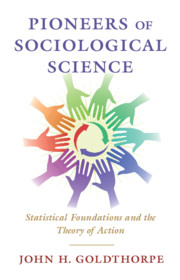Book contents
- Pioneers of Sociological Science
- Pioneers of Sociological Science
- Copyright page
- Dedication
- Contents
- Figures
- Acknowledgements
- Introduction
- 1 The Beginnings
- 2 Quetelet and His Critics
- 3 The English Statisticians
- 4 The Sample Survey Specialists
- 5 Weber and the Concept of Action
- 6 From Columbia to Chicago
- 7 From Chicago back to Columbia
- 8 Duncan and Sociology as a Population Science
- 9 The Return to the Concept of Action and Micro–Macro Relations
- 10 Conclusion
- References
- Index
6 - From Columbia to Chicago
Ogburn and Sociology as Science
Published online by Cambridge University Press: 15 February 2021
- Pioneers of Sociological Science
- Pioneers of Sociological Science
- Copyright page
- Dedication
- Contents
- Figures
- Acknowledgements
- Introduction
- 1 The Beginnings
- 2 Quetelet and His Critics
- 3 The English Statisticians
- 4 The Sample Survey Specialists
- 5 Weber and the Concept of Action
- 6 From Columbia to Chicago
- 7 From Chicago back to Columbia
- 8 Duncan and Sociology as a Population Science
- 9 The Return to the Concept of Action and Micro–Macro Relations
- 10 Conclusion
- References
- Index
Summary
The new English statistics entered into American social science chiefly through Columbia University, as a result of Giddings’ enthusiasm for the work of Pearson and of other faculty members visiting and remaining in close touch with Pearson. Ogburn, as a graduate student at Columbia, was introduced to the new statistics, and made use of correlation and regression in early research in the fields of social class and politics and the social consequences of business cycles. After taking up a chair at Chicago in 1927, he became involved in debates over the nature of sociology and argued explicitly for its understanding as science. He insisted on the importance of the precise, statistically informed description and analysis of social phenomena, on concepts being made operational for research purposes so as to allow for measurement in some form, on theory being open to empirical test, and on the need for sociologists, even when involved in public policy issues, to maintain their professional objectivity. But Ogburn did not himself show any great interest in theory development, being perhaps, under the influence of Pearson, disinclined to ‘look too far behind phenomena’ and also finding little of value to him in the theoretical approaches prevailing at Chicago.
- Type
- Chapter
- Information
- Pioneers of Sociological ScienceStatistical Foundations and the Theory of Action, pp. 101 - 119Publisher: Cambridge University PressPrint publication year: 2021



